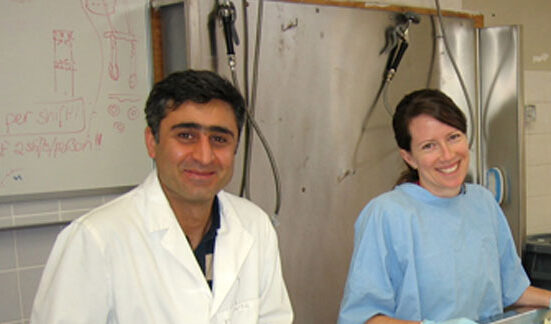The Poultry CRC is supporting a University of Melbourne PhD student in her quest to develop a new vaccine for more effective control of inclusion body hepatitis (IBH) outbreaks in Australian broiler flocks.
Penelope Steer, who grew up on a sheep and cattle property in central western Queensland and graduated from The University of Queensland with a Bachelor of Applied Science in Rural Technology, majoring in Animal Science, has been awarded a CRC scholarship to help complete her PhD, which will focus on the development of a new single or dual serotype vaccine.
Penelope joined Associate Professor Amir Noormohammadi, Head of Avian Medicine at The University of Melbourne’s School of Veterinary Science, and his team as a research assistant conducting a project on detection and typing of Fowl Adenoviruses (FAdV) in the Australian poultry industry.
According to Associate Professor Noormohammadi, Penelope’s research brought about a novel diagnostic test and strain identification technique for diseases caused by FAdV in the poultry industry.
“This test is currently in use in our laboratory as a routine test and has revealed that outbreaks of IBH in Australia are caused by two strains of FAdV, 8b and 11, from different serotypic and species groups,” he said. “Given the lack of cross-protection between serotypes 8b and 11, protection against outbreaks of IBH in Australian broiler flocks may require a vaccine that incorporates both of these FAdV serotypes.”
“Penelope started her PhD project in my group earlier this year, with her main aim to develop a serotype-specific serological assay for FAdV, assess the efficacy of the currently available FAdV vaccine against the newly identified FAdV-11, with an ultimate goal of developing a combined FadV-8b and 11 vaccine.”
“Penelope has a broad range of skills covering advanced molecular biological techniques, protein expression, virological methods and cell culture. She is very enthusiastic to learn about poultry diseases and enjoys contributing to routine diagnostic work, including post-mortem procedure, in our laboratory.”
It was following a stint in London working for Schering Plough on a coccidiosis vaccine that Penelope decided to focus on animal disease research.
“Based on key findings from an RIRDC funded IBH project, which concluded that IBH outbreaks in Australian broiler flocks are the result of infection with FAdV-8b, which is the same serotype as the current FAdV vaccine, or FAdV-11, my PhD will focus on development of a new single or dual serotype vaccine,” said Penelope.
“In the initial stages of my project, during plaque purification of the viruses, the suite of diagnostic PCR tests developed at the APCAH laboratory as part of a Poultry CRC funded project will be employed to confirm the pure virus stocks are free from contaminating pathogens.”


